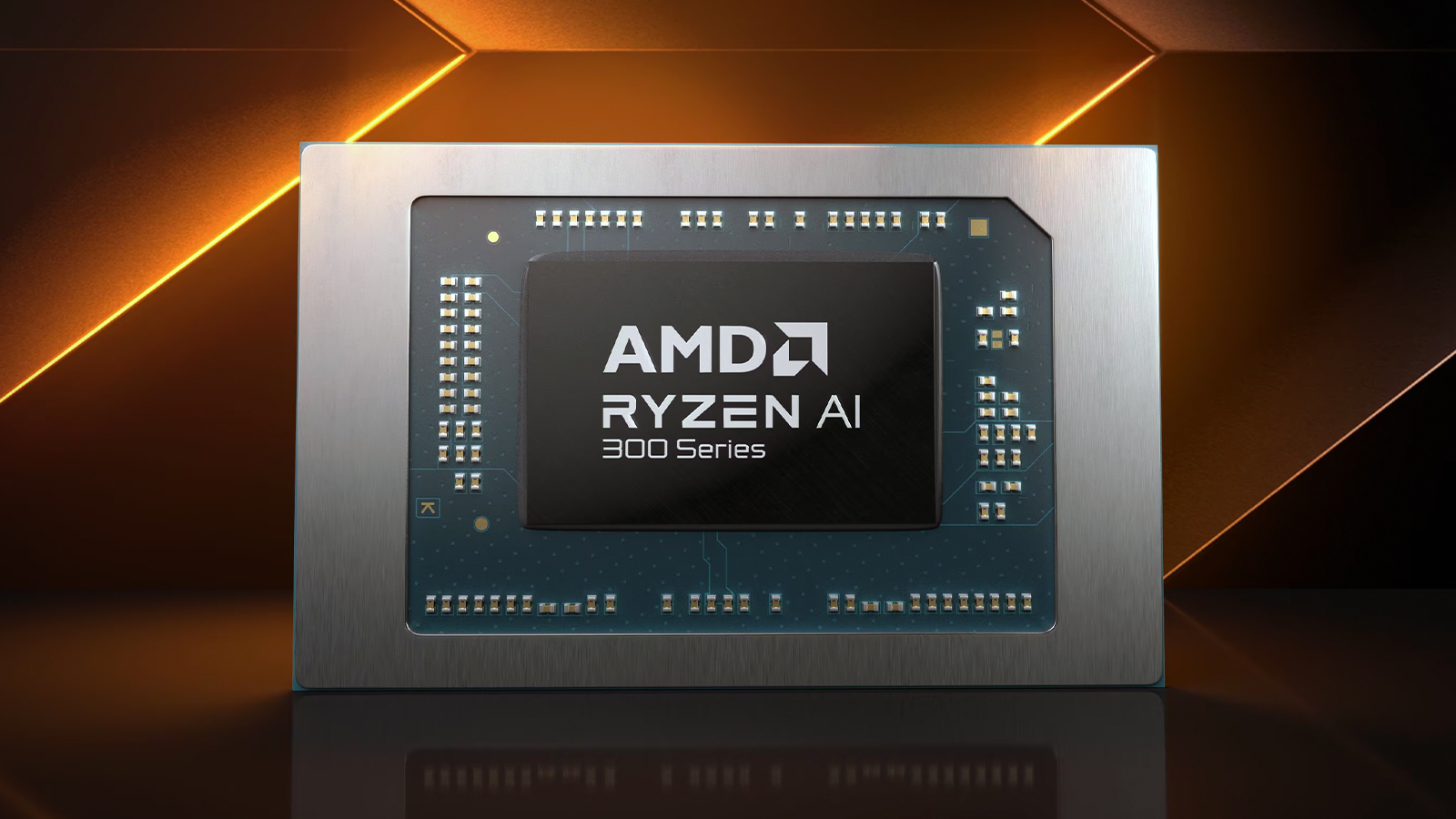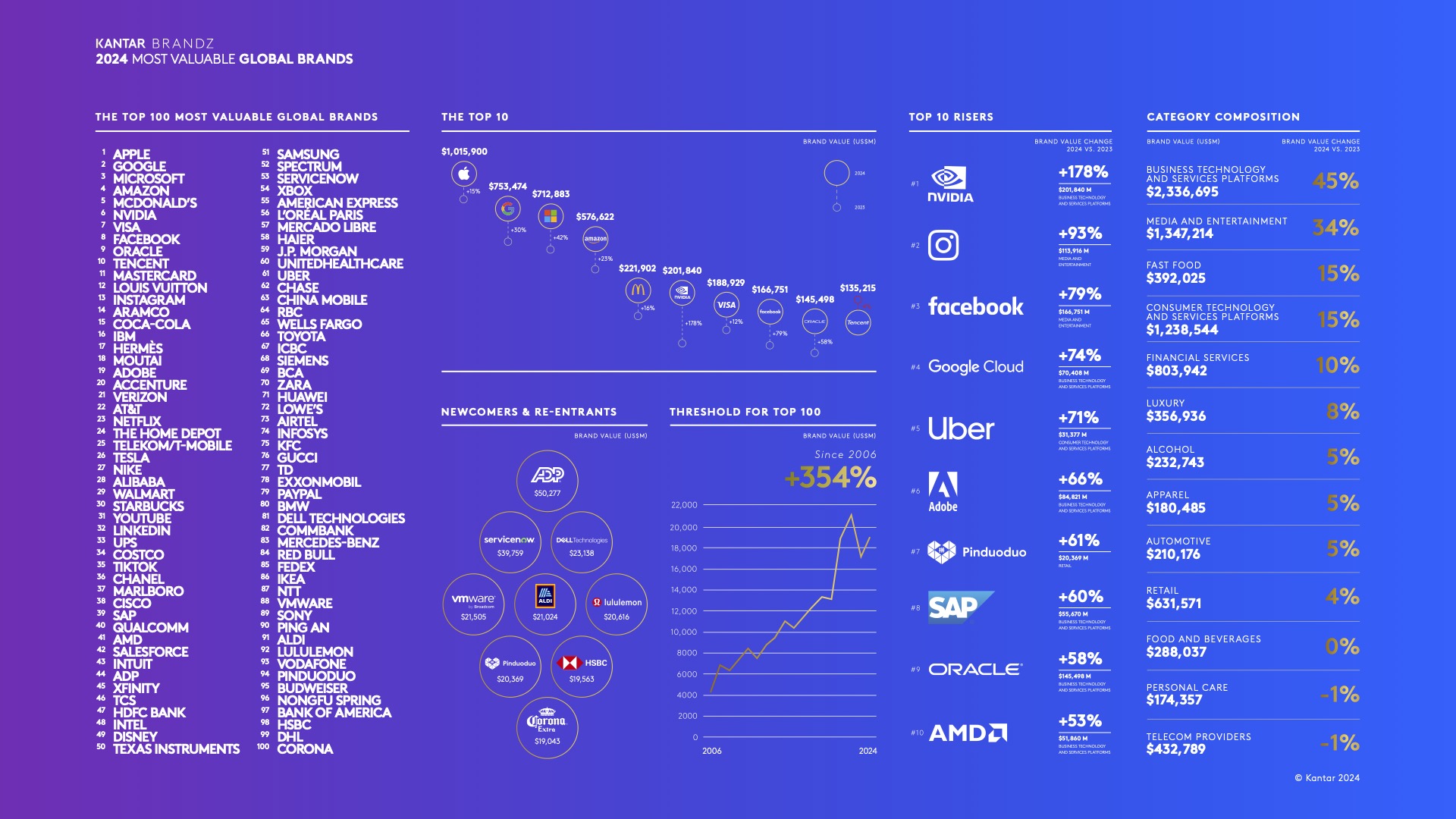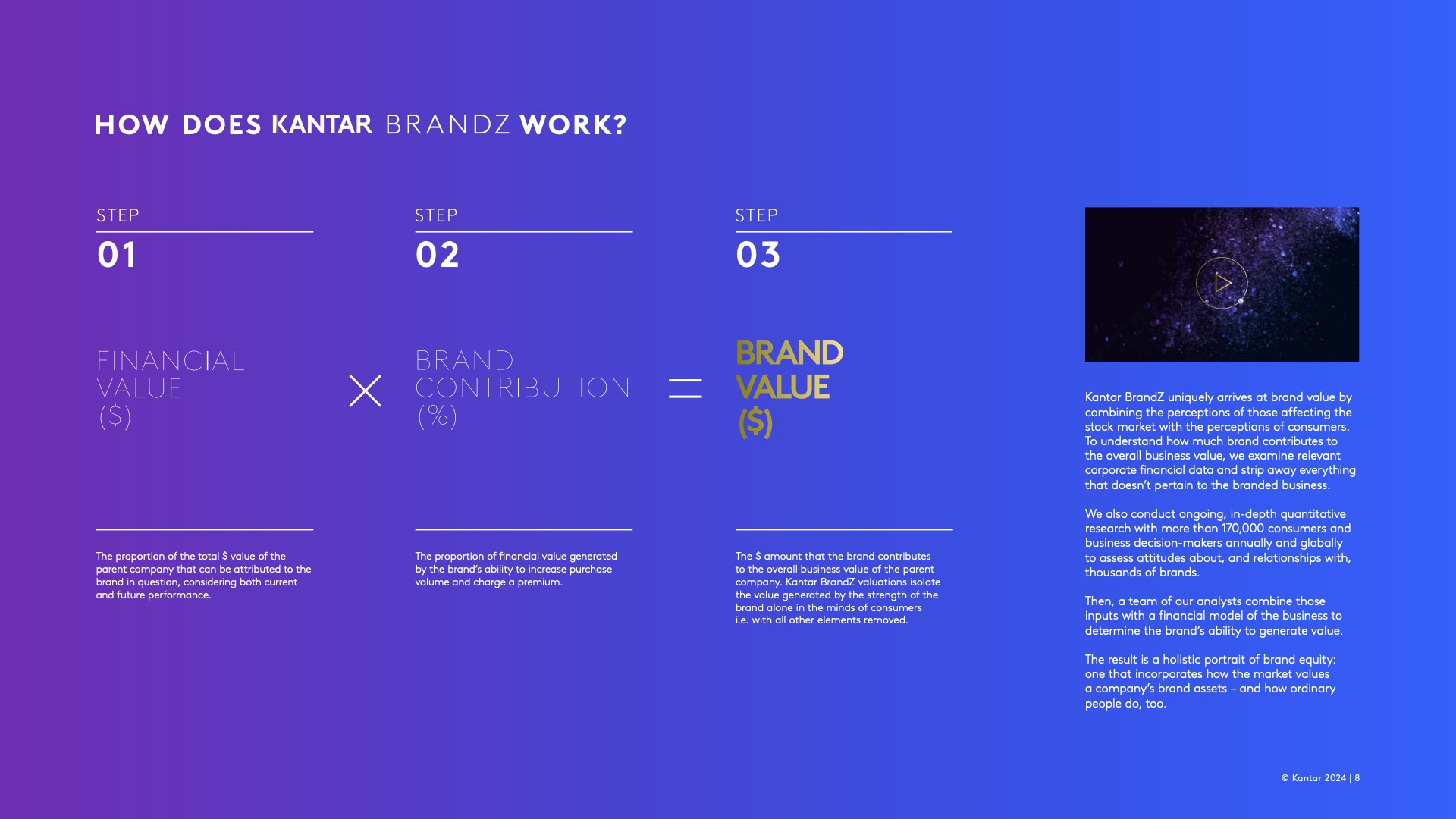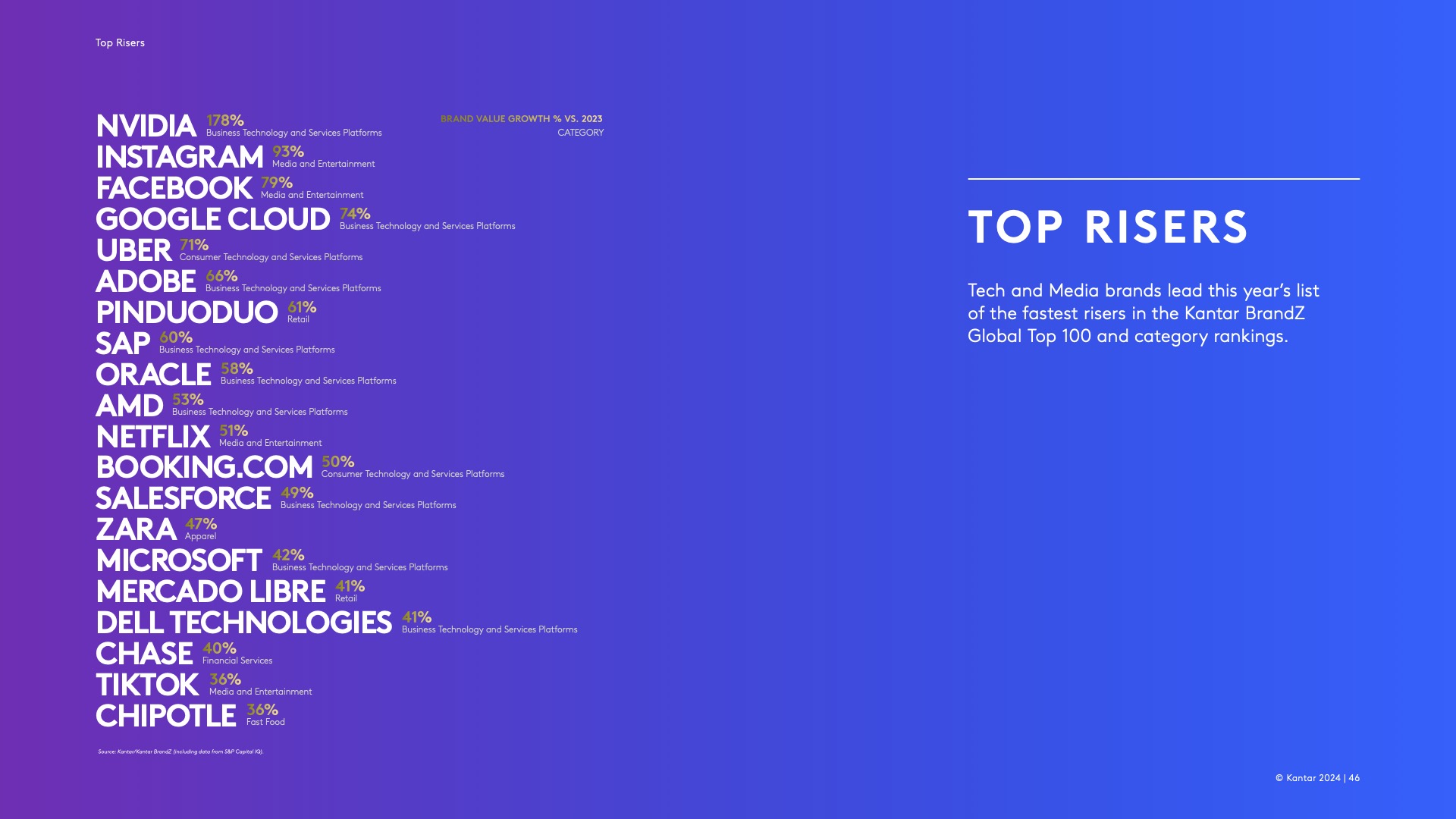AMD now has better brand recognition than Intel — firm rides AI wave to win on Kantar’s BrandZ Most Valuable Brands report
Intel climbed four spots on the list, but AMD rose nine places.

AMD used its branding message and advances in AI to surpass Intel in brand recognition, leveraging its advances in AI to attain 53% year-over-year brand growth since 2023. The chipmaker is ranked 41st on Kantar’s BrandZ Most Valuable Brands report for 2024. That places it above such big names as Intel, Texas Instruments, and Samsung.
In the report’s Business Technology and Services Platforms category, AMD climbed nine places in the rankings with a brand value of $51.86 million. This number reflects the value of the company’s brand recognition alone.
It is derived by multiplying a company’s financial value in dollars by its brand contribution. The brand contribution is the proportion of the financial value generated by increasing its purchase volume. Kantar says its BrandZ valuation “isolates the value generated by the strength of the brand alone in the minds of consumers.”
Kantar believes AMD’s growth is due in large part to its ability to innovate in technologies such as AI and spatial computing. Nvidia grew 178% year-over-year for its innovations in those fields. AMD and most of the other 20 Top Risers benefited from such advances.



Intel, on the other hand, has only grown 29% since 2023, rising four places to be ranked 48th. In 2023, Intel also underwent a fair bit of rebranding, some of which drew a fair bit of negative feedback. Intel made significant changes to its logo and jingle while also discarding brands like Pentium and Celeron, which have been household names for decades.
Interestingly, in 2023, none of the report’s 20 Top Risers were in the tech industry. Instead, companies in telecommunications, food and beverages, and luxury brands enjoyed the spotlight. AMD also made it into the Top 10 Risers list, dominated almost exclusively by tech or tech-adjacent brands.
If you’re curious about which brands Kantar ranked as the most valuable in 2024, the list is unlikely to surprise you. The top five are Apple, Google, Microsoft, Amazon, and McDonald’s; in that order, Nvidia trails only slightly behind in sixth place.
Get Tom's Hardware's best news and in-depth reviews, straight to your inbox.

Jeff Butts has been covering tech news for more than a decade, and his IT experience predates the internet. Yes, he remembers when 9600 baud was “fast.” He especially enjoys covering DIY and Maker topics, along with anything on the bleeding edge of technology.
-
Avro Arrow This is EXACTLY why AMD needs to sell Radeons for significantly less than their GeForce counterparts. Their biggest barrier to gaining marketshare in the GPU space is the number of people who have never owned Radeons and are therefore not comfortable trying them (a GPU is not a cheap purchase after all).Reply
There was a time when the performance levels of top-end AMD and top-end Intel CPUs wasn't even comparable. The gap between them was pretty huge and now they've overcome Intel. OTOH, the performance gap between Radeon and GeForce has never been as big which means that catching up to GeForce wouldn't be as huge a task as catching up to Core was.
If AMD was able to catch Intel by offering value that couldn't be ignored, then there's no question that, using similar tactics, that Radeon wouldn't be able to catch GeForce. They just have to put more focus on it. As is often said, few people would choose an RX 7900 XTX over an RTX 4080 Super with prices set as they are. It was very telling however that when the RTX 4080 was $1200 and the RX 7900 XTX was $1000, the XTX outsold the RTX by a significant margin. This is because, at the end of the day, most people don't care about RT performance (as shown by every online poll that I've ever seen) and with high-end video cards, most people don't care about upscaling either because we don't use it. One of the reasons that I bought my XTX was to be able to play games natively and I'm sure that I'm not alone. -
rluker5 Perhaps we can start calling AMD chipzilla now ;pReply
Intel is totally the underdog taking on 3 larger companies: AMD, Nvidia and TSMC at the same time. And can't forget about fending off ARM. -
DS426 Intel stills wins in x86 marketshare on both client and server, but it's the smallest gap it's ever been and continues to shrink. Client PC's for enterprise IT departments don't switch so easily, and indeed Intel has long-running and durable business partnerships up and down the board.Reply
We'll see if Battlemage's execution is strong enough to nab some dGPU marketshare for Intel.
Funny how "Intel inside" used to be the big thing but now it's more of a desire for "AMD inside," lol.
I was surprised that Wal-Mart didn't come in higher on this list. -
ThomasKinsley Reply
You're not alone. One person I know decided to ditch Nvidia and go for the XTX after 10 years on a GTX680. They're happy with it, except they're a little concerned that driver support won't last, especially since they are having some trouble with software/drivers at the moment. I hope the rumors aren't true that AMD isn't making an 8900XT/XTX.Avro Arrow said:This is EXACTLY why AMD needs to sell Radeons for significantly less than their GeForce counterparts. Their biggest barrier to gaining marketshare in the GPU space is the number of people who have never owned Radeons and are therefore not comfortable trying them (a GPU is not a cheap purchase after all).
There was a time when the performance levels of top-end AMD and top-end Intel CPUs wasn't even comparable. The gap between them was pretty huge and now they've overcome Intel. OTOH, the performance gap between Radeon and GeForce has never been as big which means that catching up to GeForce wouldn't be as huge a task as catching up to Core was.
If AMD was able to catch Intel by offering value that couldn't be ignored, then there's no question that, using similar tactics, that Radeon wouldn't be able to catch GeForce. They just have to put more focus on it. As is often said, few people would choose an RX 7900 XTX over an RTX 4080 Super with prices set as they are. It was very telling however that when the RTX 4080 was $1200 and the RX 7900 XTX was $1000, the XTX outsold the RTX by a significant margin. This is because, at the end of the day, most people don't care about RT performance (as shown by every online poll that I've ever seen) and with high-end video cards, most people don't care about upscaling either because we don't use it. One of the reasons that I bought my XTX was to be able to play games natively and I'm sure that I'm not alone. -
watzupken The way they brand recognition is derived is questionable. I don't deny that AMD's reputation have improved drastically over the past half a decade, but Intel is a household name. You can ask most non-tech savvy person, and they will recognize Intel, but not AMD.Reply -
dalek1234 Reply
MLID said that they aren't making those high-end cards. His sources are people from AMD. Let's see if they go back to high-end with RDNA 5, but there is not info about that yet. Too far into the future, I guess.ThomasKinsley said:...I hope the rumors aren't true that AMD isn't making an 8900XT/XTX. -
dalek1234 I'm surprised Intel didn't drop. Intel is destroying it's own brand yet brand recognition is up? That doesn't make senseReply -
Avro Arrow Reply
What driver problems are they having? My XTX has been rock-solid the whole time that I've owned it and I bought it last August. Tell them to try running DDU in safe mode to remove their current driver and re-install it again. Sometimes Windows does something that screws things up (and that happens to both Radeon and GeForce drivers). Windows has become extremely invasive when it comes to installed software as of late.ThomasKinsley said:You're not alone. One person I know decided to ditch Nvidia and go for the XTX after 10 years on a GTX680. They're happy with it, except they're a little concerned that driver support won't last, especially since they are having some trouble with software/drivers at the moment. I hope the rumors aren't true that AMD isn't making an 8900XT/XTX. -
ThomasKinsley Reply
They received this error when attempting to update their software: "The version of AMD Software that you have launched is not compatible with your currently installed AMD graphics driver"Avro Arrow said:What driver problems are they having? My XTX has been rock-solid the whole time that I've owned it and I bought it last August. Tell them to try running DDU in safe mode to remove their current driver and re-install it again. Sometimes Windows does something that screws things up (and that happens to both Radeon and GeForce drivers). Windows has become extremely invasive when it comes to installed software as of late.
Then when using the AMD Software Compatibility Tool (as per AMD's official recommendation for this problem): "Error downloading AMD Software"
They ended up redoing their drivers and they reported that it's running better than ever. IMHO, it's not too big of a problem but it's a side effect of adopting cutting edge tech. Certainly not as bad as the 4090's connector issue. 😏 -
Avro Arrow Reply
Wow, that is just plain weird. It sounds like they didn't remove the old driver before installing the new one. That causes issues akin to this one. I'm just glad that everything worked out for them. :giggle:ThomasKinsley said:They received this error when attempting to update their software: "The version of AMD Software that you have launched is not compatible with your currently installed AMD graphics driver"
Then when using the AMD Software Compatibility Tool (as per AMD's official recommendation for this problem): "Error downloading AMD Software"
They ended up redoing their drivers and they reported that it's running better than ever. IMHO, it's not too big of a problem but it's a side effect of adopting cutting edge tech. Certainly not as bad as the 4090's connector issue. 😏